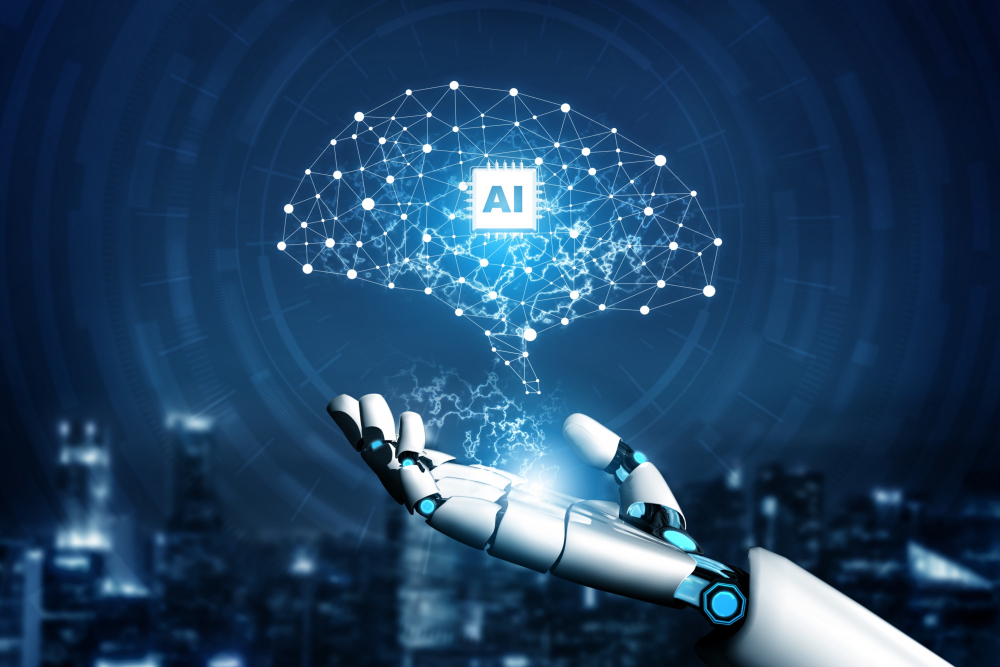Remember there was a face app? It app gained attention all over the world and went viral due to its exceptional photo editing skills and filters. TikTok is another groundbreaking social media platform, that revolutionized the culture of short videos. Coming back to this day, we have Siri, Alexa, and Google Assistant bought a new era of technology control with voice commands.
All these show how far technology has disrupted the mobile app development sector. From shopping to networking, we have an app available for everything. One of the futuristic trends in mobile application development is the use of artificial intelligence. Businesses of all types are leveraging AI to their full strategic advantage. It brings innovative solutions to enhance the overall user experience.
We can see chatbots, automation, voice assistants, no-code, & more where AI has changed the game. According to market reports, the global mobile artificial intelligence (AI) market is anticipated to reach $84.80 billion by 2030, demonstrating a Compound Annual Growth Rate (CAGR) of 26.44%.
For those curious about how artificial intelligence is reshaping mobile app development, let’s delve into the current developments in the industry. But first, let’s understand the role of AI in mobile app development.
Understanding the impact of AI in the field of mobile application
To put it in a much simpler way, AI is like the brain behind the scenes that can make your app more smarter and interactive. Earlier mobile apps were limited to the power of processing storage capacity. Moreover, the development involved a lot of labor, extensive coding & testing. As we step into the era of AI, it has definitely revolutionized the way apps are developed. AI has played a major role in enhancing user experience and pushing the boundaries of what’s possible.
1. Enhanced User Experience:
One of the most significant impacts of AI in mobile app development is the elevation of user experience. Through machine learning algorithms and natural language processing, AI enables apps to understand user behavior, preferences, and patterns. This understanding facilitates the creation of personalized and adaptive user interfaces, resulting in a more engaging and intuitive experience for the end-users.
AI-powered chatbots and virtual assistants further contribute to improved user interactions. These intelligent systems can handle user queries, provide real-time support, and even anticipate user needs. As a result, mobile apps become more user-friendly, reducing friction and enhancing overall satisfaction.
2. Predictive Analytics and User Behavior:
AI has empowered mobile apps with the ability to predict user behavior through advanced analytics. By analyzing vast amounts of data, AI algorithms can identify trends, patterns, and correlations, allowing developers to anticipate user actions. This predictive capability is invaluable for tailoring app features, content, and recommendations, thus delivering a more personalized experience.
For instance, e-commerce apps leverage AI to analyze purchase histories, browsing patterns, and demographic information to suggest products that align with individual preferences. Similarly, entertainment apps use AI to recommend movies, music, or articles based on a user’s past choices, creating a more customized content consumption experience.
3. Accelerated Development Processes:
Traditional app development is often time-consuming, requiring extensive coding and testing. AI is changing this landscape by introducing automation and streamlining various development processes. AI-powered tools can generate code snippets, automate testing procedures, and identify bugs more efficiently, significantly reducing development time.
Machine learning algorithms can analyze past project data to identify areas for improvement, helping developers make informed decisions. This increased efficiency not only accelerates the development cycle but also reduces costs.
4. Improved App Security:
As the digital landscape becomes more complex, ensuring the security of mobile applications is crucial enough. AI can help in fortifying app security by detecting and mitigating potential threats in real time. AI algorithms can analyze user behavior patterns to identify anomalies that may indicate unauthorized access or malicious activity.
Moreover, AI enhances authentication processes through biometrics and facial recognition, providing a more secure and seamless user experience. By continuously learning and adapting to emerging threats, AI contributes to the ongoing battle against cybersecurity challenges in the mobile app development space.
5. Advanced Data Processing and Insights:
The sheer volume of data generated by mobile apps can be overwhelming for developers seeking valuable insights. Data processing tools powered by AI have the capability to analyze vast datasets, identifying significant patterns and trends. This empowers developers to make decisions on data insights, comprehend user preferences, and enhance app features for improved performance.
Additionally, AI supports instantaneous data analysis, enabling applications to dynamically adapt to evolving user requirements. For example, fitness apps can use AI to analyze health data and provide instant recommendations for personalized workouts or nutrition plans.
6. Voice and Image Recognition:
The rise of voice-activated virtual assistants like Siri and Google Assistant highlights the growing importance of voice recognition in mobile applications. AI-powered speech recognition technology enables users to interact with apps using natural language, opening up new avenues for hands-free and intuitive user experiences.
Image recognition is another frontier where AI is making strides. Mobile apps can leverage AI algorithms to identify objects, scenes, or even people in images. This capability is particularly useful in augmented reality (AR) applications, gaming, and e-commerce, where users can interact with the digital world through their device’s camera.
7. Integration of Augmented Reality:
AI and augmented reality (AR) are converging to create immersive and interactive mobile app experiences. AR applications use AI to understand the user’s environment, recognize objects, and overlay digital information seamlessly. This integration enhances gaming experiences, provides interactive navigation, and revolutionizes industries such as retail and education.
For instance, furniture retailers can develop AR apps that allow users to visualize how a piece of furniture would look in their homes before making a purchase. Another example is how Lenkskart included a feature where users can identify how that particular specs would look on them before purchasing.
8. Hyper-Personalization through AI:
AI’s ability to analyze user data in real-time enables hyper-personalization in mobile apps. This goes beyond recommending products or content based on past behavior; it involves understanding a user’s emotions, context, and preferences at a deeper level. Hyper-personalized apps can adapt their interfaces, content, and features in real-time to match the user’s current state.
For example, a health and wellness app equipped with AI might recognize when a user is stressed and offer guided meditation or relaxation exercises. By catering to individual needs on a moment-to-moment basis, these apps create a more profound and meaningful connection with users.
Wrapping It Up:
The impact of Artificial Intelligence on mobile app development is undeniable. In the era of technological advancements, AI has stood as a beacon for innovation and possibilities. That’s the reason AI has become a smart choice for developers to drive success in their mobile application development. Moreover, AI can help you outshine the competitors by integrating with AR/VR, IoT, Blockchain, or other modern technologies.
By partnering with Wynbit, you will leverage the full potential of artificial intelligence in the development of smart mobile applications. From chatbots to virtual assistants, we have a customized solution for businesses all over the globe


